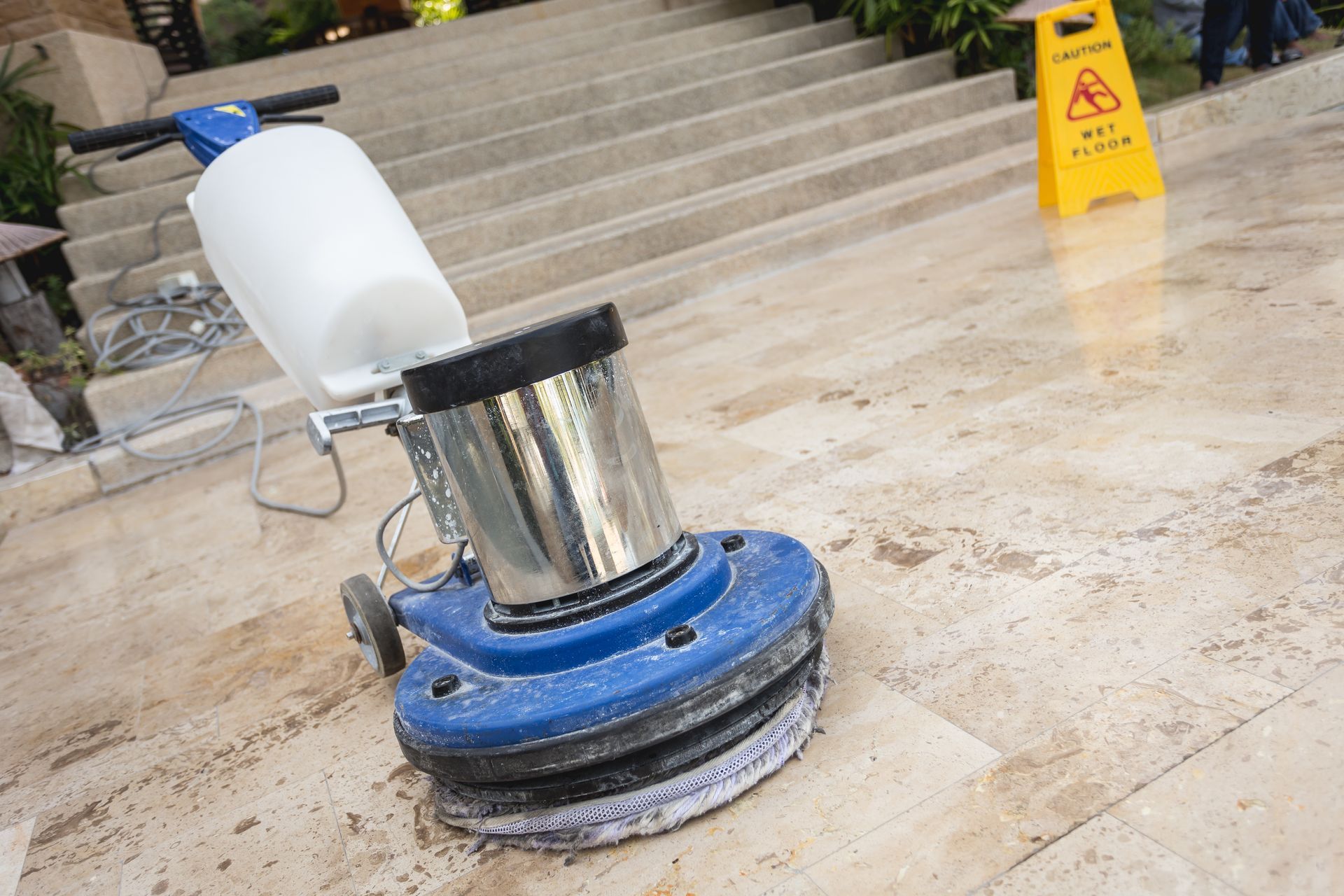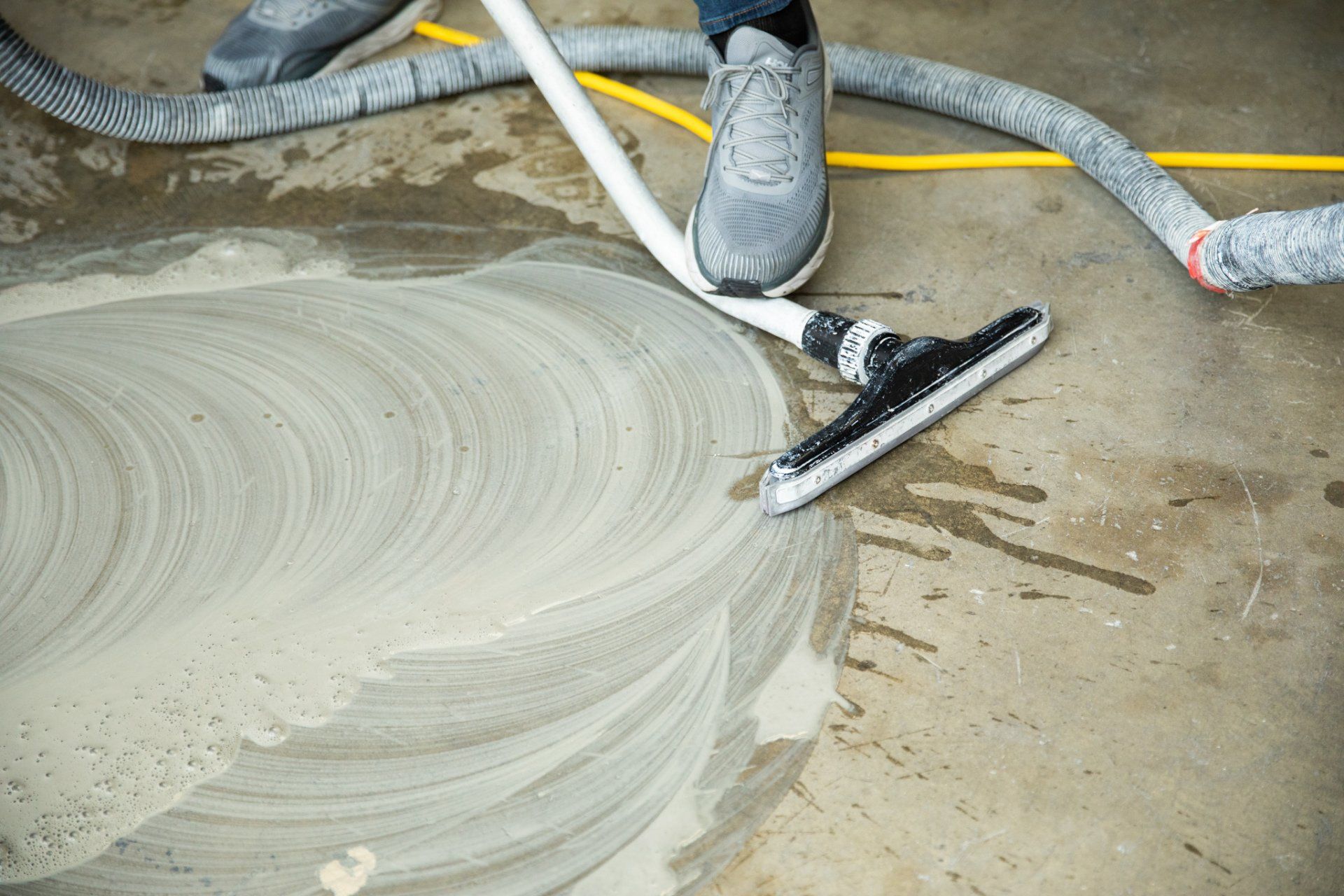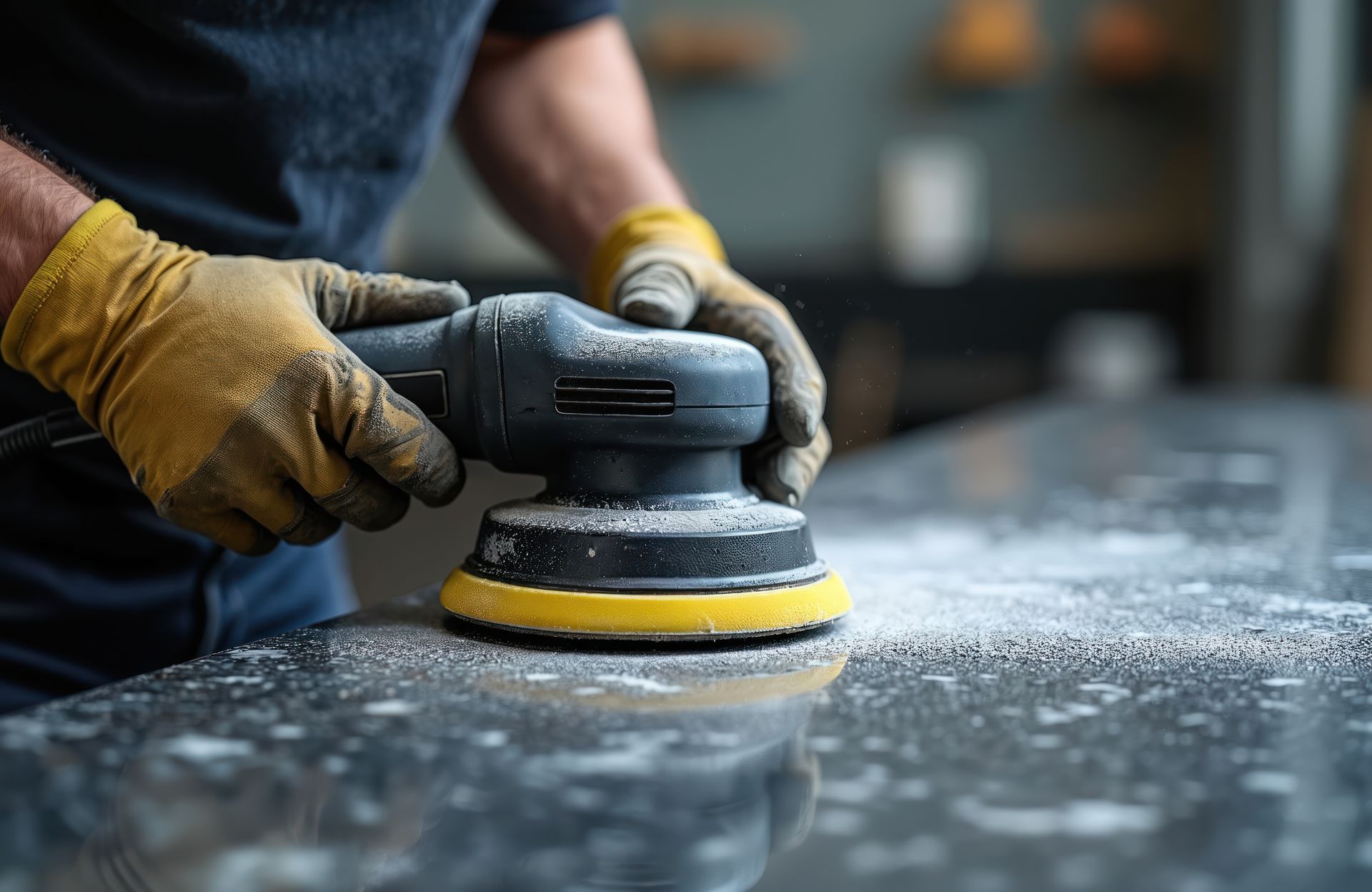Resources & Education
We have over 30 years of natural stone cleaning expertise and we'd love to share.
Learn More From Our Natural Stone Experts

Natural stone brings elegance and luxury to bathroom spaces, but it also comes with unique maintenance challenges. Bathrooms are high-moisture environments where water exposure, humidity, and poor ventilation can lead to mold, mildew, and water damage if stone surfaces are not adequately cared for. Whether you have marble, travertine, limestone, or granite in your bathroom, the key to preserving its beauty is routine care and moisture control. 1. Choose the Right Stone and Finish Before we dive into care tips, it's essential to understand that not all natural stones are created equal in terms of moisture resistance. Granite and quartzite are denser and more resistant to water damage. Softer stones, such as marble, limestone, and travertine, are more porous and absorb moisture more readily. Polished finishes offer more protection against water and staining than honed or tumbled finishes. If you're remodeling, choosing a less porous stone or a sealed polished finish can reduce maintenance needs. 2. Seal Your Stone Surfaces Regularly Natural stone is porous, meaning it can absorb water, soap residue, and body oils. This absorption can lead to staining, etching, or mold growth over time. A high-quality penetrating sealer provides a protective barrier that repels moisture and contaminants, offering enhanced protection against environmental damage. How often you should seal your bathroom stone depends on the type of stone and the amount of use the bathroom receives. Generally, sealing once or twice a year is recommended for high-moisture areas, such as showers and floors. How to Test Your Sealant: Sprinkle a few drops of water on the stone. If the water beads on the surface, the seal is still effective. If it soaks in and darkens the stone, it’s time to reseal. 3. Improve Ventilation and Airflow Poor ventilation is one of the most significant contributors to mold and mildew growth in bathrooms. Without proper airflow, moisture lingers in the air and on surfaces, creating the perfect environment for mold spores. Tips to improve ventilation: Use an exhaust fan during and after showers Leave the bathroom door open when not in use Wipe down shower walls and countertops after use Use a dehumidifier if the bathroom lacks adequate airflow 4. Clean Regularly with Stone-Safe Products Cleaning natural stone surfaces with the right products helps remove residue before it can penetrate the stone or encourage the growth of mold. Avoid using bleach, vinegar, or acidic bathroom cleaners, as they can damage the surface and degrade the sealer. Instead, use: A pH-neutral stone cleaner A soft microfiber cloth or non-abrasive sponge A squeegee for glass and polished stone surfaces in the shower Clean shower walls and floors at least once a week. Wipe down vanities and countertops daily. 5. Address Grout and Caulk Lines Grout and caulk lines are often overlooked but are among the most vulnerable parts of a bathroom. They can crack, separate, or absorb moisture over time, providing a breeding ground for mold and mildew. Even sealed stone is at risk if the grout is compromised. Inspect grout and caulk regularly. Reseal grout annually, and replace cracked or deteriorated caulk as soon as possible. Mold that forms in grout lines should be treated quickly with a stone-safe mold remover. 6. Avoid Leaving Standing Water Leaving water to sit on your stone surfaces can lead to water spots, discoloration, or eventual deterioration of the sealant. This is especially important in stone showers and on bathroom vanities. After using the shower or washing your hands, make it a habit to: Wipe down countertops and sinks Squeegee water from the shower walls and floors Dry off any wet areas to prevent water from soaking into the stone 7. Watch for Signs of Water Damage Early signs of water damage include: Darkened stone or water rings Efflorescence (white powdery residue) Dull or etched spots on polished surfaces Musty odors or visible mildew If you notice any of these signs, take action immediately. You may need to reseal, deep clean, or, in some cases, consult a professional for restoration. Conclusion Natural stone can be a stunning and durable choice for bathrooms, but it needs special attention in wet and humid environments. Regular sealing, proper cleaning, moisture control, and maintenance of grout and caulk are crucial in preventing mold, mildew, and water damage. With a few consistent habits and the proper care routine, your bathroom’s stone surfaces can maintain their beauty and strength for years to come. If your stone is showing signs of wear or damage, consider consulting a professional for a deep cleaning, polishing, and sealing treatment to restore its original condition.
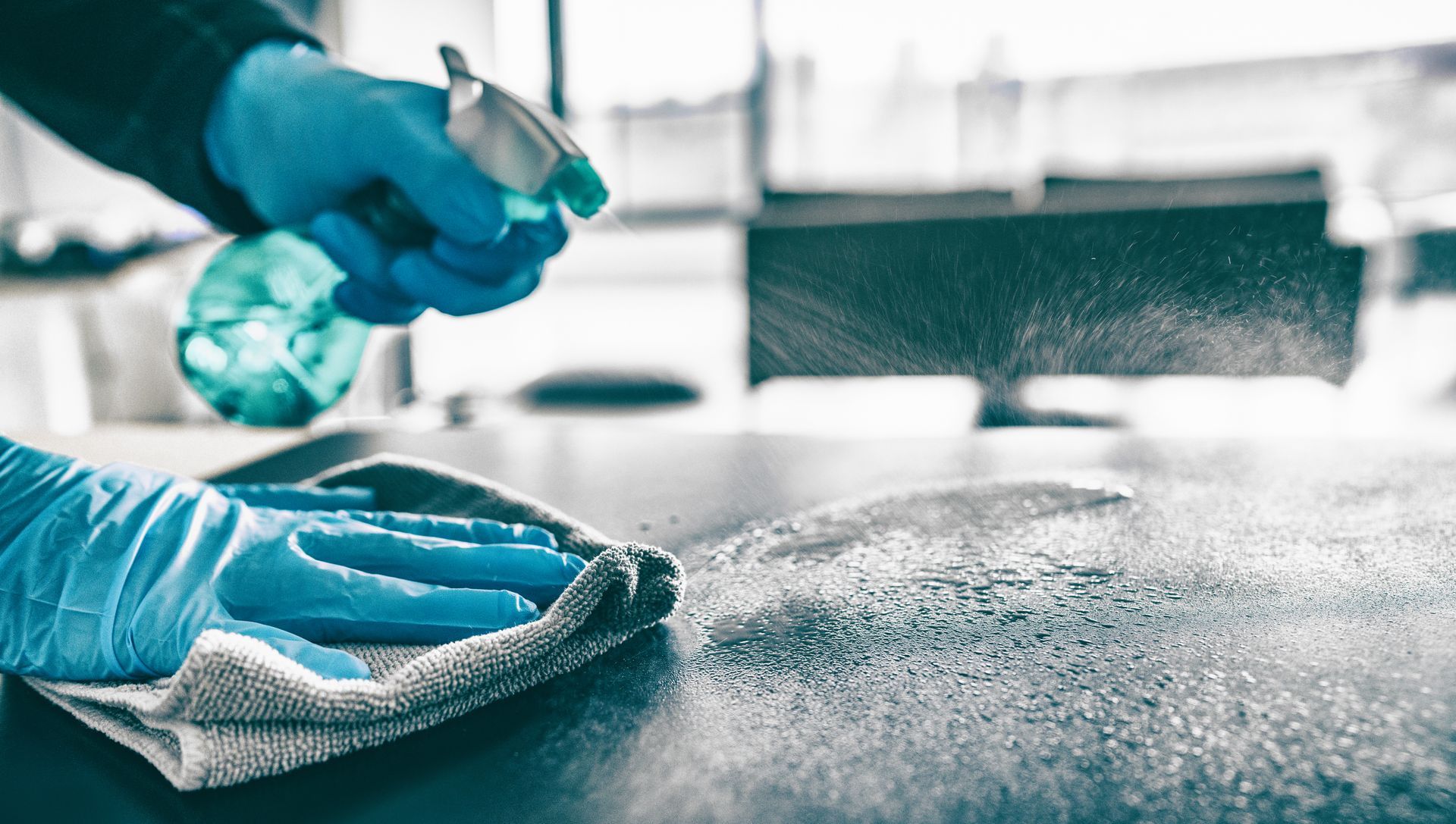
The COVID-19 era brought increased awareness around hygiene and disinfection in our homes and businesses. While keeping surfaces clean and germ-free is essential, it's equally important to ensure that your cleaning methods don’t damage the surfaces themselves, especially when it comes to natural stone like marble, granite, limestone, and travertine. Natural stone is beautiful and durable, but also porous and sensitive to certain chemicals. Using the wrong disinfectants can lead to etching , staining , and dulling of the stone’s finish. In this article, we’ll walk you through how to safely disinfect natural stone surfaces without compromising their integrity. Why Traditional Disinfectants Can Be Harmful to Stone Many common disinfectants contain acidic ingredients like vinegar , lemon juice , or bleach , which can: Etch the stone, leaving dull spots or cloudy patches. Break down sealants , reducing the stone’s resistance to moisture and staining. Discolor the surface, especially on light-colored stones like marble and limestone. Even alcohol-based products can cause long-term issues if used too frequently or left on the surface without wiping. Safe Disinfection Methods for Natural Stone 1. Use a pH-Neutral Stone Cleaner with Antibacterial Properties Some stone-safe cleaners are formulated to disinfect without causing harm. Look for labels that specify: pH-neutral Safe for natural stone Antibacterial or antimicrobial action These products are ideal for daily or weekly cleaning and gentle enough for regular use. Pro Tip: Brands like StoneTech , Granite Gold , or Weiman offer stone-safe disinfectants designed for marble, granite, and more. 2. Use 70% Isopropyl Alcohol – With Caution When stronger disinfecting is needed (such as after exposure to illness), isopropyl alcohol can be used, but carefully. How to use it: Mix 70% isopropyl alcohol with distilled water in a 1:1 ratio. Lightly mist the solution onto the surface. Let it sit for 30 seconds to disinfect. Wipe dry with a soft microfiber cloth. Follow with a pH-neutral stone cleaner to remove any residue and restore shine. Avoid prolonged exposure , and never use alcohol on unsealed stone, as it can dry out or damage the surface. 3. Use Disposable Disinfectant Wipes , Sparingly During peak COVID times, many people turned to disinfectant wipes. While convenient, most contain quaternary ammonium compounds or alcohol, which can harm natural stone over time. If using disinfectant wipes: Test on a small, inconspicuous area first. Wipe the area with water and a soft cloth immediately after use. Don’t use regularly, save for occasional high-risk scenarios. Disinfecting Products to Avoid To prevent damage, do not use the following on natural stone surfaces: Vinegar or lemon juice Bleach or hydrogen peroxide Ammonia or window cleaners Generic antibacterial wipes (e.g., Clorox, Lysol) without rinsing Abrasive scrubbing pads These can etch, dull, discolor, or weaken the protective seal on your stone. Daily Cleaning vs. Disinfection It's important to distinguish between cleaning and disinfecting : Cleaning removes dirt, oils, and debris from the surface. Disinfecting kills bacteria, viruses, and other pathogens. For natural stone, daily cleaning with a pH-neutral cleaner is enough in most households. Reserve disinfecting for situations that truly call for it, such as illness in the home, handling raw meat, or post-exposure to public surfaces. Don’t Forget to Reseal Disinfecting, even with safe products, can gradually wear down your stone’s protective seal. To maintain water and stain resistance: Check your seal every 6–12 months. Reapply a stone-safe sealer if water no longer beads on the surface. This will keep your stone protected and make cleaning (and disinfecting) easier in the long run. Final Thoughts Disinfecting your home shouldn’t come at the cost of damaging your beautiful natural stone surfaces. By choosing the right products and following a few simple precautions, you can keep your stone clean, sanitized, and stunning for years to come. Need help restoring dull or etched stone? Marble Stone Polish offers professional stone cleaning, polishing, and sealing to bring your surfaces back to life, safely and effectively. Contact us today for a free consultation!

Stone countertops are a popular choice in kitchens and bathrooms for their durability, timeless beauty, and variety of styles. Whether you have granite, marble, quartzite, or another natural stone, proper maintenance is essential to keep your countertops looking as stunning as the day they were installed. We’ll walk you through the dos and don’ts of stone countertop maintenance , with practical tips for everyday care and long-term preservation. The Dos of Stone Countertop Maintenance 1. Do Use a pH-Neutral Cleaner Stone countertops should be cleaned with a gentle, pH-neutral cleaner made specifically for natural stone. These products effectively remove dirt and grime without damaging the seal or surface. Pro Tip: For daily cleaning, mix a few drops of mild dish soap with warm water and wipe with a soft cloth or sponge. 2. Do Wipe Up Spills Immediately Natural stone is porous—especially marble, limestone, and travertine—which means spills can quickly soak in and cause stains or etching. Pro Tip: Blot (don’t wipe) acidic spills like wine, coffee, lemon juice, or tomato sauce right away to prevent staining and surface damage. 3. Do Use Cutting Boards and Trivets Stone is durable, but it’s not invincible. Cutting directly on stone can dull your knives and scratch the surface. Similarly, placing hot pots and pans directly on the countertop can damage the stone or compromise the seal. Pro Tip: Always use cutting boards for food prep and trivets or hot pads for cookware. 4. Do Seal Your Countertops Regularly Sealing adds a protective layer that helps prevent stains and water absorption. While granite and quartzite are more resistant, softer stones like marble and limestone need regular sealing. Pro Tip: Test your countertops by sprinkling water on the surface. If the water absorbs rather than beads up, it’s time to reseal. 5. Do Use Coasters Under Glasses and Bottles Condensation and acidic beverages can leave rings or marks on your stone countertops over time. Pro Tip: Place coasters under drinks and bottles to protect the surface—especially if they’re chilled or carbonated. The Don’ts of Stone Countertop Maintenance 1. Don’t Use Vinegar, Bleach, or Ammonia These everyday household cleaners are too harsh for natural stone and can etch, dull, or discolor the surface. Even natural DIY solutions like vinegar and lemon should be avoided. Pro Tip: Stick to stone-safe cleaners and always check the label for compatibility with your countertop type. 2. Don’t Use Abrasive Scrubbers Steel wool, scouring pads, or harsh scrubbing brushes can scratch the stone’s surface, especially on softer stones like marble and limestone. Pro Tip: Use soft microfiber cloths or non-scratch sponges for cleaning. 3. Don’t Ignore Small Stains or Chips A small stain or chip may seem harmless but can worsen over time, especially in moisture-prone areas like kitchens and bathrooms. Pro Tip: Address any damage early. Try a poultice paste for stubborn stains, or call a professional for repair or resurfacing. 4. Don’t Sit or Stand on Countertops Stone countertops are strong, but they’re not designed to support the weight of a person. Sitting or standing on them can cause cracks or even lead to structural damage. Pro Tip: Always use a step stool or ladder instead of climbing onto your counters. 5. Don’t Skip Routine Maintenance Even if your countertops look fine on the surface, neglecting regular cleaning and sealing can shorten their lifespan and diminish their appearance. Pro Tip: Create a simple maintenance schedule for cleaning and sealing based on your stone type and usage. Conclusion Stone countertops are an investment in your home’s value and beauty. With the right care and maintenance—like using gentle cleaners, sealing regularly, and avoiding common pitfalls—you can keep your natural stone surfaces looking flawless for years to come. Follow these dos and don’ts, and you’ll preserve the charm, shine, and durability of your countertops no matter what life throws at them. Need help with stone maintenance or sealing? Contact [Your Company Name] for expert stone care and professional cleaning services!

Natural stone surfaces, such as marble, granite, limestone, or travertine, bring elegance and sophistication to any space. However, due to wear, scratches, and exposure to moisture and dirt, these surfaces can lose their shine over time. Polishing natural stone is essential for restoring its glossy finish and enhancing its durability. Why Polishing Natural Stone is Important Polishing is not just about aesthetics—it also serves several practical benefits: Restores Shine – Natural stone can lose its luster over time due to foot traffic, spills, and regular use. Polishing rejuvenates the surface. Protects Against Stains – A polished surface makes it more resistant to stains and moisture absorption. Smooths Imperfections – Proper polishing techniques can diminish or remove Minor scratches and etching. Extends Longevity – Regular polishing helps maintain the integrity of the stone, ensuring it lasts for decades. Step-by-Step Guide to Polishing Natural Stone Like a Pro 1. Identify Your Stone Type Different types of natural stone require different polishing techniques: Marble & Limestone – Soft, porous stones require gentle polishing to avoid scratches. Granite & Quartzite – Hard, dense stones that require diamond polishing pads for effective results. Travertine – Porous and textured, requiring extra sealing after polishing. Slate – Naturally rough, often enhanced with a stone enhancer rather than polished. Understanding your stone type ensures you use the right products and techniques. 2. Clean the Surface Thoroughly Before polishing, the stone surface must be free of dirt, debris, and stains. How to Clean Natural Stone Before Polishing: Remove loose dirt – Sweep or dust the surface. Use a pH-neutral cleaner – Mix warm water with a mild stone cleaner or a few drops of dish soap. Wipe with a soft cloth or mop – Avoid harsh brushes or scrubbing pads. Dry the surface completely – Let it air dry or use a microfiber cloth to remove excess moisture. Pro Tip: Avoid acidic or abrasive cleaners, which can etch the surface and make polishing more difficult. 3. Select the Right Polishing Method Two main methods for polishing natural stone are DIY hand polishing and machine polishing . DIY Hand Polishing (For Small Areas) Hand polishing is a practical option if you have a small surface, such as a countertop or tabletop. What You Need: A stone polishing powder or compound (specific to your stone type) A soft cloth or buffing pad Water How to Hand Polish: Apply polishing powder – Sprinkle a small amount on the surface. Dampen a soft cloth – Use water to create a paste-like consistency. Buff in circular motions – Gently rub the surface until the shine starts to appear. Wipe clean – Use a damp cloth to remove any excess residue. Pro Tip: Use a high-quality stone polish spray after buffing for extra shine. Machine Polishing (For Floors and Large Areas) A machine polisher is the best option for larger surfaces, such as stone floors or walls. What You Need: A variable-speed stone polisher (also known as a buffer) Diamond polishing pads (grit levels ranging from coarse to fine) Water spray bottle A sealant (optional, but recommended) How to Machine Polish: Attach a low-grit diamond polishing pad (e.g., 50-100 grit) to the polisher. Lightly wet the surface – Use a spray bottle to prevent overheating. Begin polishing in sections – Move the machine in circular motions over the stone. Gradually switch to finer grits – Increase the grit level (200, 400, 800, 1500, and 3000) for a smoother finish. Wipe down the surface – Remove dust and excess polish residue with a clean cloth. Pro Tip: Always keep the surface slightly damp while polishing to avoid friction burns on the stone. 4. Seal the Stone After Polishing After polishing, sealing your natural stone is highly recommended, especially for porous stones like marble, limestone, and travertine. How to Apply a Sealer: Choose a high-quality stone sealer – Look for a penetrating sealer suitable for your stone type. Apply with a soft cloth or sponge – Work in even layers. Allow time to absorb – Let the sealer sit for 10-15 minutes. Buff away excess – Use a clean, dry cloth to remove any leftover sealer. Pro Tip: Sealing protects against stains, water damage, and daily wear. Depending on usage, it should be reapplied every 6-12 months. 5. Maintain the Shine with Regular Care Once your natural stone is polished, follow these maintenance tips to keep it looking flawless: ✔ Use pH-neutral stone cleaners – Avoid acidic substances like vinegar, lemon juice, or harsh chemicals. ✔ Wipe up spills immediately – Prevent stains from setting. ✔ Use coasters, mats, and rugs – Protect surfaces from scratches and heat. ✔ Re-polish as needed – Consider light re-polishing for high-traffic areas every 6-12 months. Common Mistakes to Avoid 🚫 Using acidic cleaners – These can etch and dull the surface. 🚫 Skipping sealing – Unsealed stone is more prone to stains and damage. 🚫 Using rough pads or steel wool – These can scratch and ruin the finish. 🚫 Applying too much polish – Overuse of polish can create residue buildup. Final Thoughts Polishing natural stone is an essential step in maintaining its beauty and durability. Whether refreshing a marble countertop, restoring a granite floor, or enhancing the look of travertine tiles, the right techniques and tools will ensure a flawless finish. With proper cleaning, polishing, and sealing, your natural stone surfaces will continue to shine for years. If your stone requires extensive restoration or you are unsure about the process, consider hiring Marble Stone Polish for expert results. A well-maintained natural stone surface is a valuable investment and a timeless feature in any home.
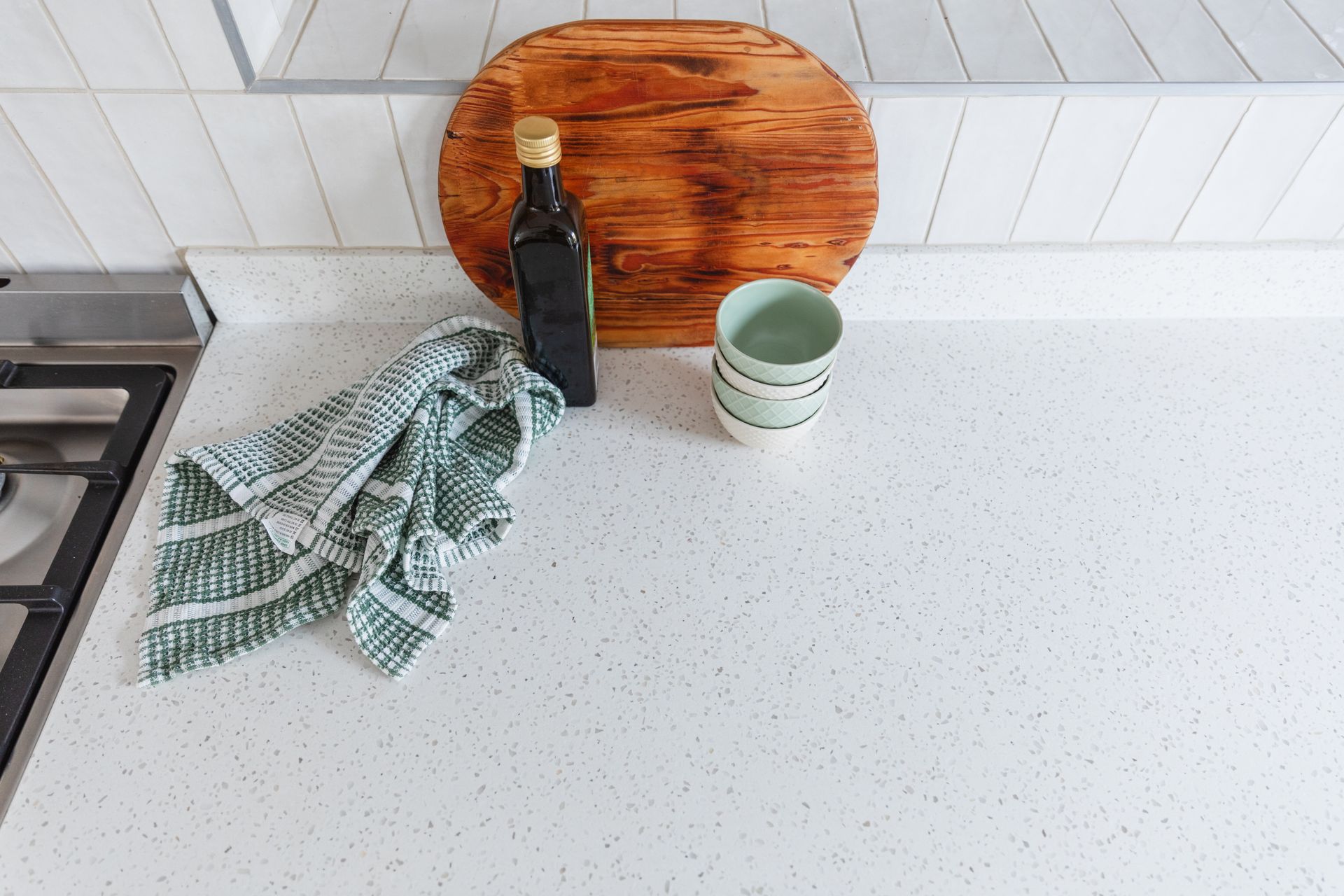
Daily Cleaning Routine: For most natural stones, wiping down surfaces daily with a soft cloth and a pH-neutral cleaner or water with a few drops of mild soap is sufficient. Avoid excessive water on surfaces, as standing water can penetrate stone pores and lead to discoloration. Weekly or Deep Cleaning Routine: Use a stone-specific cleaner that matches your stone type for weekly or deeper cleaning. Avoid all-purpose household cleaners, which may contain acids or abrasives that can damage the stone. Handling Spills and Stains: Immediate Action: Blot any spills immediately with a soft cloth. Do not rub, as this can spread the stain. For Stubborn Stains: If you encounter a tough stain, like oil or wine, create a poultice with baking soda and water. Apply it to the stain, cover it with plastic wrap, and leave it overnight. Rinse and wipe clean the next day. Avoiding Common Mistakes: Never use acidic cleaners, such as vinegar, lemon, or bleach. Avoid using abrasive scrubbers or brushes that could scratch the stone. Do not use wax or polish unless specifically recommended for your stone type, as this can create buildup and damage.

Natural stone surfaces, such as marble, granite, limestone, and travertine, add elegance and beauty to homes and commercial spaces. However, each type of natural stone has unique properties, and proper care is essential to maintain its appearance and durability. This guide covers the different types of natural stone and offers detailed cleaning and maintenance tips to help you keep your surfaces looking beautiful for years. 1. Types of Natural Stone and Their Properties Marble Appearance: Known for its classic elegance, marble often features veining patterns and comes in shades of white, gray, and beige. Durability: While durable, marble is a softer stone and can be prone to scratching, etching, and staining if not properly cared for. Best Uses: Ideal for bathroom surfaces, low-traffic floors, and decorative elements. Granite Appearance: Granite offers a range of colors and patterns, from subtle neutrals to bold colors, and is often speckled or mottled. Durability: Extremely hard and durable, granite resists scratching, heat, and staining, making it ideal for high-use areas. Best Uses: Perfect for kitchen countertops, high-traffic floors, and outdoor applications. Limestone Appearance: Limestone has a softer, earthy look with warm, neutral tones and a smooth, matte finish. Durability: Softer than granite, limestone is more porous and can stain if not sealed, but it holds up well with proper care. Best Uses: Commonly used for bathroom floors, wall cladding, and fireplace surrounds. Travertine Appearance: This stone has a distinctive textured appearance with natural pitting and comes in earthy shades like beige, tan, and brown. Durability: Similar to limestone, travertine is porous and requires sealing, but with regular care, it can last a lifetime. Best Uses: Often used for bathroom floors, shower walls, and outdoor patios. Slate Appearance: Slate is dark and rustic, with a natural cleft texture that can be smooth or rough. Durability: Slate is tough, stain-resistant, and non-slip, making it great for high-traffic areas. Best Uses: Popular for entryways, kitchens, outdoor patios, and wall cladding. 2. General Cleaning Tips for All Natural Stones Daily Cleaning Use a soft, dry cloth to wipe down surfaces daily, removing dust and preventing dirt buildup. For floors, sweep or vacuum regularly with a soft-bristle attachment to avoid scratching. Weekly Cleaning Clean surfaces with a pH-neutral, non-abrasive stone cleaner to remove any grime or residue. Avoid acidic cleaners like vinegar or lemon juice, which can damage stone surfaces, especially marble and limestone. Dealing with Spills Blot spills immediately with a soft cloth to prevent stains. Avoid wiping, as this can spread the liquid. For oily spills, sprinkle baking soda over the area to absorb the oil, then wipe clean after a few minutes. 3. Maintenance and Sealing for Different Types of Stone Marble Maintenance Sealing: Marble is a porous stone that should be sealed every 6-12 months, depending on usage. Cleaning: Use a pH-neutral cleaner specifically designed for marble. Avoid acidic cleaners that can etch and dull the surface. Polishing: To keep marble looking polished and shiny, consider using a marble polishing powder a few times a year. Granite Maintenance Sealing: Although granite is less porous, sealing is still recommended annually for high-traffic areas. Cleaning: Clean granite with a mild detergent or granite-specific cleaner and a soft cloth. Polishing: Granite doesn’t require polishing as often but can benefit from an occasional granite polish to enhance its shine. Limestone Maintenance Sealing: Limestone is quite porous and should be sealed at least once or twice a year to protect against moisture and stains. Cleaning: Use a soft cloth and a stone-safe cleaner. Avoid harsh chemicals that can damage limestone’s surface. Avoid Acidic Substances: Since limestone is sensitive to acids, protect it from acidic substances like citrus juice, wine, or vinegar. Travertine Maintenance Sealing: Travertine requires regular sealing every 6-12 months, especially for high-use areas like bathrooms. Cleaning: Use mild, pH-neutral cleaners and a soft cloth. Avoid abrasives that can wear down the stone’s natural pits and textures. Polishing: Polishing can help reduce visible wear, but because of travertine’s porous nature, keep polishing products light. Slate Maintenance Sealing: Seal slate every 1-2 years, especially in moist areas, to enhance its natural colors and protect against stains. Cleaning: A damp cloth or mop with a pH-neutral cleaner works best. Avoid wax-based cleaners that can build up and dull the finish. Polishing: Avoid polishing slate, as it has a naturally matte finish. However, you can use a penetrating enhancer to highlight its colors. 4. Stain Removal Guide for Natural Stone Removing Oil Stains Blot the excess oil with a soft cloth. Apply a poultice made of baking soda and water to the stained area. Cover it with plastic wrap and let it sit for 24 hours. Remove the poultice and rinse with water. Removing Organic Stains (Wine, Coffee, Food) Use a soft cloth to blot the stain. Apply a cloth soaked in hydrogen peroxide to the stain. Let it sit for a few hours, then rinse with water. Removing Rust Stains Use a rust remover specifically formulated for natural stone for stubborn rust stains. Follow the manufacturer’s instructions carefully, as some rust removers can be harsh. 5. Preventive Measures for Long-Lasting Natural Stone Use Coasters, Trivets, and Mats Place coasters under glasses and trivets under hot cookware to protect stone surfaces from heat and moisture damage. Avoid Heavy Impact Avoid dropping heavy objects on stone surfaces to prevent chipping, especially with softer stones like marble and travertine. Use Rugs in High-Traffic Areas Place area rugs or runners in high-traffic areas, especially in entryways and hallways, to reduce wear and tear on stone floors. Conclusion Caring for natural stone is a rewarding endeavor that preserves the beauty and value of your home’s surfaces. With the right cleaning products, regular maintenance, and timely sealing, you can keep your stone surfaces looking stunning for years. By following these guidelines, you can enjoy the elegance and durability that natural stone brings to your home, confident that your investment is well-protected.

Natural stone adds elegance, sophistication, and lasting beauty to any home. Whether you’re updating your kitchen countertops, flooring, or bathroom tiles, selecting the right type of stone can elevate your space while providing durability and value. However, choosing the ideal natural stone depends on several factors, including where you plan to use it, how much maintenance you want to do, and the aesthetic you want to achieve. 1. Consider Durability and Use Each natural stone type has unique characteristics, which make it better suited for certain areas of the home based on the wear and tear it will endure. Kitchen Countertops: Granite or Quartzite Best Option: Granite and quartzite are excellent choices for kitchen countertops due to their extreme durability, heat resistance, and resistance to scratching. Why Granite or Quartzite? These stones are highly durable and can withstand busy kitchen demands, such as hot pans, sharp knives, and constant cleaning. They are also less porous than marble, making them more resistant to staining from common kitchen substances like oils and sauces. Bathroom Surfaces: Marble or Travertine Best Option: Marble and travertine add a luxurious feel to bathrooms but require regular maintenance to keep their beauty intact. Why Marble or Travertine? These stones are softer and more porous, ideal for less traffic-heavy areas like bathrooms. While marble is prone to etching from acidic substances (like shampoo or soap), it retains its beautiful, polished look with regular sealing and proper care. Travertine’s natural texture offers a rustic charm and is ideal for both floors and shower walls. Flooring: Limestone or Slate Best Option: Limestone and slate provide excellent durability and traction, making them ideal for floors in entryways, living rooms, or patios. Why Limestone or Slate? Limestone is a versatile stone that works well in traditional and modern designs. It’s softer than granite but holds up well when sealed properly. On the other hand, Slate offers a rugged texture and is naturally slip-resistant, making it a fantastic choice for high-traffic areas and outdoor patios. 2. Aesthetics: Find Your Style Natural stone comes in a variety of colors, textures, and patterns. The stone you choose should complement the design and feel of your space. For a Classic, Timeless Look: Marble Marble’s veining and polished finish provide an elegant and timeless appearance. White or gray marble is popular for a clean, sophisticated aesthetic, often used in high-end kitchens, bathrooms, and fireplaces. For a Rustic, Earthy Feel: Travertine or Slate With its warm, neutral tones and textured surface, Travertine creates an earthy, rustic look that works well in Mediterranean or Tuscan-style homes. Slate’s darker tones and natural cleft surface offer a rustic, rugged appeal, perfect for creating a cozy, natural feel indoors or outdoors. For a Modern, Sleek Finish: Granite or Quartzite Granite and quartzite come in various colors and patterns, from subtle whites to dramatic blacks. These stones are ideal for a sleek, contemporary look, especially with modern fixtures and clean lines. For Bold, Eye-Catching Designs: Onyx or Exotic Stones Consider onyx or other exotic stones with striking patterns and vibrant colors if you want to make a bold design statement. These stones are often used as statement pieces in backsplashes, fireplace surrounds, or accent walls. 3. Maintenance and Care Another key factor when choosing natural stone is the amount of maintenance required. Some stones need regular sealing and gentle cleaning, while others are low-maintenance. Low-Maintenance Stones: Granite and Quartzite Granite and quartzite are highly durable and require minimal maintenance beyond periodic sealing. They are also resistant to scratching, heat, and staining, making them ideal for homeowners looking for a long-lasting, easy-to-care-for surface. Medium-Maintenance Stones: Marble and Limestone Marble and limestone are softer stones that require more frequent sealing to protect against staining and etching. They also need gentle cleaning products to avoid damage, but they can last for decades with proper care. High-Maintenance Stones: Onyx and Exotic Stones Onyx and some other exotic stones are more delicate and require careful handling. They are prone to scratching and staining, so they need frequent sealing and regular maintenance to preserve their beauty. 4. Cost Considerations Natural stone prices can vary widely, so it's essential to choose a stone that fits your budget while still meeting your durability and aesthetic needs. Budget-Friendly Options : Travertine, limestone, and some granites tend to be more affordable. Mid-Range Options: Marble, slate, and higher-end granite varieties usually fall into a moderate price range. Luxury Options: Onyx, quartzite, and other exotic stones are typically expensive due to their rarity and striking visual appeal. 5. Climate and Location Consider the climate and environment where the stone will be installed, especially for outdoor spaces or areas prone to moisture. For Outdoor Use: Granite, slate, and quartzite are excellent for outdoor spaces like patios and walkways because they withstand extreme weather conditions and don’t absorb water easily. For Humid Areas: In bathrooms or other humid areas, opt for non-porous stones like quartzite or properly sealed granite, which are less likely to absorb moisture and develop mold. Conclusion Choosing the right natural stone for your home requires balancing aesthetics, durability, maintenance, and budget. Granite and quartzite are excellent choices for high-traffic and heavy-use areas, while marble and travertine are ideal for creating a luxurious, classic look in low-traffic spaces. For outdoor applications or rustic design, slate and limestone shine, while bold, exotic stones like onyx make stunning statement pieces. By carefully considering your specific needs and preferences, you can select the perfect natural stone to enhance your home’s beauty for years.


